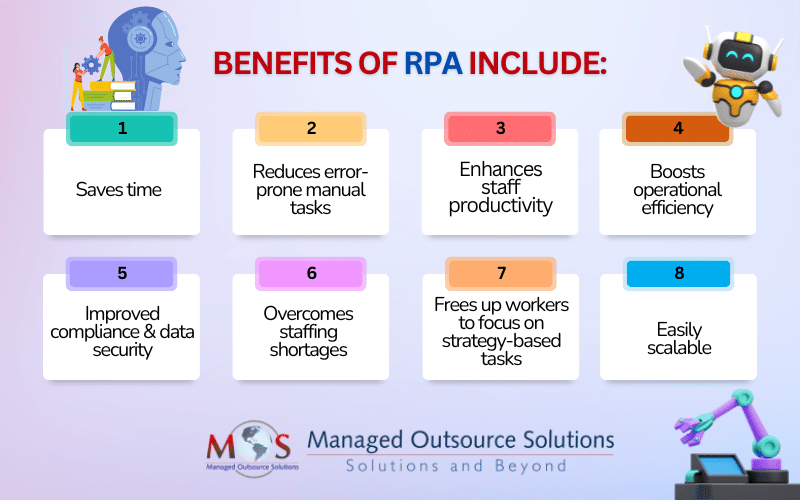Customer expectations have gone through the roof with the advancements in technology over the past decade. Instant gratification is a norm with customers nowadays and that puts a burden on businesses to meet their ever-growing demands, without significantly putting a strain on their budget. Robotic Process Automation (RPA) may be the most effective catalyst businesses need, to take them to the next level.
RPA & outsourcing is slowly but steadily transforming business operations, reducing operational costs and increasing overall efficiency by streamlining workflows. Business enterprises around the globe are now actively embracing this hybrid strategy for improving their overall productivity and customer experience. This blog will explore what RPA is, its benefits and how the future looks with outsourcing RPA services.
What Is RPA?
Robotic Process Automation is a software technology that makes it easy to build & manage bots that emulate repetitive, rule-based actions, which are typically performed by human beings. These bots are trained to mimic human actions in a digital environment like customer support, payments and data entry. By handling these mundane tasks, RPA frees up the human workforce to focus more on strategic tasks where human judgment and rationale are required.
How Can RPA and Outsourcing Benefit Businesses?
- Enhanced Efficiency: Outsourcing has been a method used for decades to control costs, get access to specialized expertise and improve scalability. RPA further enhances these by streamlining the process, thereby making it faster with much accuracy and lowered costs. Outsourcing solutions that integrate RPA can enhance efficiency without compromising quality.
- Improved Data Security & Compliance: Outsourcing internal tasks can raise alarms regarding data security of sensitive information. RPA significantly reduces that by internalizing data-driven tasks, reducing chances of any data leaks. Most RPA will be trained to be compliant with standard regulations like HIPAA or GDPR, as automated workflows follow necessary steps diligently.
- Better Labor Management: Outsourcing can reduce burdens related to management and costs involving hiring a team to manage tasks. But with RPA, it can further reduce the reliance on external labor, as it automates a portion of the tasks—especially, repetitive and redundant ones. This enables the team to focus on highly skilled/ strategic tasks.
- 24×7 Operations: RPA can function round-the-clock, making it the ideal partner to work when it comes to businesses operating across multiple time zones. Also, while human teams work regular hours, RPA can handle tasks during nighttime or weekends, ensuring operations aren’t interrupted thereby reducing turnaround time for critical tasks.
Challenges in Implementing RPA for Outsourcing
- Initial Investment: Even though RPA offers significant long-term savings, the initial setup cost can be expensive, especially for small-scale businesses. The technology is in its nascent stages when it comes to adoption and hence, setup and customization cost can be on the higher side.
- Change Management & Training: Training & change management can come as off-putting as it is with any technological transformation and therefore, businesses need to foster an environment that will help their employees embrace RPA, understand how to work along with bots and manage related tools effectively.
- RPA Operational Compatibility: Not all tasks can be done by RPA and therefore, it is important to understand those tasks that are repetitive and can be trained on a rule-based method. Choosing the wrong task can lead to inefficiencies and turn RPA into more of becoming a bane than a blessing.
Future of RPA in Outsourcing
The future looks bright for RPA in outsourcing with adoption increasing across industries like healthcare, banking and retail where data-intensive, repetitive processes benefit from automation. And, integrating RPA with AI will only enhance capabilities, enabling bots to take part in tasks which are complex and involve strategy-based decisions. In the coming years, outsourcing models are expected to transform into hybrid structures, blending human skills with automation for improved scalable solutions. This will empower outsourcing firms to seamlessly handle demand spikes cost-effectively, making RPA an inevitable element in long-term outsourcing strategies.





